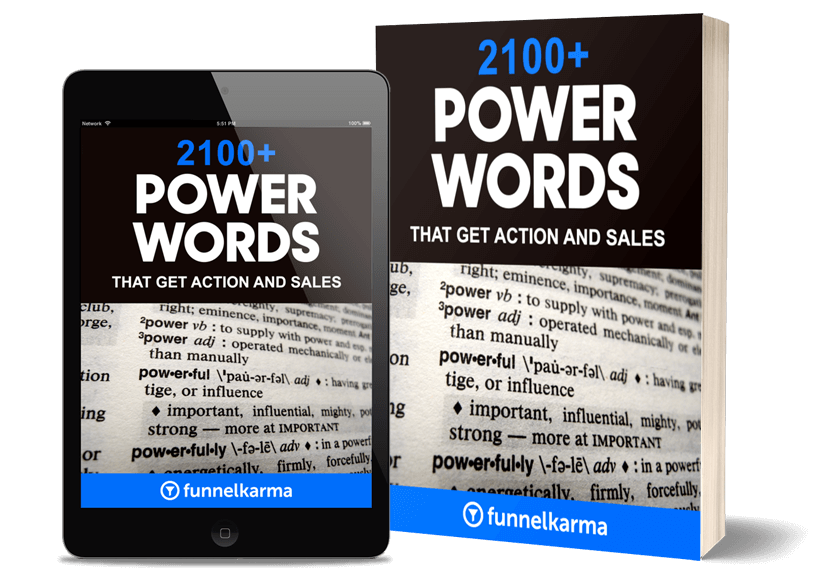Copywriting: An Easy Beginner’s Guide [2024]
Copywriting is the king of marketing… It is everywhere!
Have you ever looked at a product and thought, “I want THAT!”?
Then you probably don’t need to read any further… You’re probably pretty good at convincing yourself that you want things.
But if you’ve ever wondered how some products make it into your shopping cart and others don’t – even when they’re similar – then this copywriting guide is for you.
And if you’ve ever wondered why you can’t seem to sell your products as well as other people do, then this guide is definitely for you!
Copywriting is the art of convincing people to buy what they don’t need, or buy more than they need, or buy from YOU instead of someone else because of the way you write about it.
Copywriters can make millions by writing just a few sentences that make people feel like they HAVE TO HAVE something.
It’s an amazing skill set that has helped many entrepreneurs create businesses worth millions—and it can help YOU too!
But if you’re like most people, you might not know where to start.
So in this easy copywriting for beginners guide, I’ll show you exactly what copywriting is and how it works. I’ll also explain why copywriting is so important for your business, and how to get started with your first piece of copy.
Ready to learn more about killer copy that sells?
Great! Then let’s go.
What Is Copywriting?
Copywriting is the art of writing words that sell.
Sounds simple, right?
Well, copywriting is more than just words on a page.
Copywriting is about creating content that compels your audience to take action. It’s about writing in a way that makes people want to buy from you.
You might be thinking, “Wait a second!” I write copy for my business all the time. What else would I be doing?
But what if I told you that what you’ve been calling copywriting isn’t really copywriting at all? And what if I told you that the content you’re writing isn’t actually selling anyone on anything?
If this sounds like a familiar situation, don’t worry. We’ve all been there.
The truth is that most of the content we’re writing isn’t copywriting at all. It’s just regular old content.
And while there’s nothing wrong with regular old content, it’s not going to compel people to take action.
The truth is, you’ve been writing content to inform your audience. You want them to know what they need and how they can get it from you. This is great! But it isn’t actually selling anyone on anything.
And if you’re not selling anything, your content is not actually copywriting.
So what does it mean to be good at copywriting?
It means writing with a specific purpose in mind: to get people to take action.
And that means we need to stop thinking about our audience as an audience and start thinking of them as customers.
It means we need to stop thinking about our content as content and start thinking of it as an offer. And that means we need to stop thinking about our content as something that we create and start thinking of it as something that we sell.
This is a big change, but it’s one that will pay off big time. And if you’re not ready to make that change, then please go back and read the first paragraph again.
Whether it’s a blog or social media post, email, sales page, or landing page, copywriting involves creating compelling and persuasive copy that converts visitors into paying customers.
Need Expert Help Turning Browsers into Buyers?

Let’s Personalize Your Sales Funnel Together!
Ready to Master the Visitor-to-Customer Dance and Elevate Your Online Success?
How Copywriting Works
Copywriting works by creating a story that leads the reader to take action. With the right words, you can persuade anyone to buy anything!
The best copywriters know how to use emotion in their writing and appeal to your audience’s needs, wants and desires.
Copywriting has been around for centuries, but it wasn’t until the industrial revolution that it became an essential part of business communications.
Today, copywriters are responsible for most of the ads you see every day – on TV, radio, print and especially online in digital marketing.
Copywriters use copywriting frameworks to develop compelling headlines and persuasive content that ‘compel’ people to take action.
Whether it’s buying something, filling out a form, or signing up for email updates, well written copy attracts people to your sales funnels like bees to honey.
But what’s the secret to this?
The secret is knowing how to get inside the minds of your audience… and trigger their emotions with power words.
The truth is, copywriting has more in common with psychology than it does with creative writing. Because when you’re writing copy, you’re trying to get people to do something that they wouldn’t otherwise do.
You need to know what are their problems and needs. What issues are they trying to address, fix, or solve?
You also need to know their what motivates them, what drives them, and what their goals are.
And then, you need to find out what will get in their way and prevent them from doing what they want. What are their fears, concerns, and pain points?
You need to know how to get around these obstacles. And you need to know how to tap into them to use it to your advantage.
The best copywriters are masters of the psychology of persuasion, because they know that people don’t buy products. They buy reasons why they should buy them.
In fact, the most successful copywriters are also good psychologists.
They are experts in human behavior, because they know that people don’t act on facts and figures alone.
They know people need to be emotionally moved by something before they’ll take action. And what makes them emotionally connect with your brand?
That’s where you come in. You need to create a message that taps into their emotions. You need to craft words that will make them feel something and take action.
In other words, you need to tap into your target audience’s hopes, fears, dreams and desires.
As a copywriter, you are an artist and a psychologist. You’re also a wordsmith and grammarian.
You need to know how to use language to get people’s attention, and how to keep it there until they act on your message.
Ultimately, you need to know what makes people tick.
When you understand why people buy certain products and not others, you’ll be able to tap into that knowledge and use it in your copywriting.
Just remember, copywriting is an art form, but it’s also a science.
Why Copywriting Is Important
Copywriting is one of the most important elements in marketing and it has a very specific purpose: to get people to act.
Copywriting does this by attracting people’s attention, then keeping it there until they act on your message.
Did you know that the words you use can either make or break your business?
The truth is, well written copy sells…
… And, it can sell anything to anyone when it’s done well.
The right words have the power to persuade people into buying all sorts of stuff, even if they don’t need them at all!
On the other hand, the wrong words have the power to turn people off from what you’re selling, even if it’s exactly what they need!
And, copywriting is just about selling products or services. Copywriting is important in selling ideas, opinions, causes, movements, and even the future.
Just look at the headlines we all face when we look at our phones! Most of them are designed to scare or excite us into clicking on the link.
And, when we do click on those links, we’re often sold something!
The world of copywriting is a powerful one indeed.
In this way, copywriting is what makes the difference between an average website and a successful one. It’s what separates the brands that people love from those they forget about.
Copywriting is what helps you connect with your audience on a deeper level and build trust with them over time. And, more trust means more sales!
Add POWER To Your Copywriting [FREE Guide]

2100+ Power Words That Get Action And Sales
How Copywriting Helps Businesses: The Benefits
Copywriting is a powerful tool for businesses. It can help you communicate your message, sell more products and services, and even build trust with existing customers.
Here are three ways copywriting can help your business:
1. Copywriting helps you get noticed
Whether you’ve got a brand new business or an established one, you need to have a unique voice and message. Your website is the first impression people have of your company, and it’s not enough to just have a pretty design – you need something that makes people want to click on your link again.
That’s where copywriting comes in!
Copywriting makes it easier for people who read your content to remember what you have said.
And, this means that copywriting is a surefire way to get noticed and stand out from the crowd.
2. Copywriting increases sales and leads
Copywriting makes your site more user friendly. And this is key…
A user-friendly website means that people will stay on your site longer. And, the longer people stay on your site, the higher your chances are of converting them into customers.
Well written copy also makes it easier for people to understand what you are offering and how they can benefit from it.
This means that your visitors will be less confused and more likely to buy from you. This translates into higher conversion rates and better sales numbers overall.
If your copy is truly compelling and generates high conversions, your business will grow like wildfire. And, that’s exactly what we want.
3. Copywriting helps you build trust
Copywriting helps build relationships with customers and prospects through personalization.
When someone visits your site, they should feel like they’re interacting with YOU – not some faceless entity that doesn’t care about them at all – which is how may sites feel, right?
Once again, copywriting is your best friend here too…
Copywriting can help you improve your brand’s reputation and credibility by showing that you care about customers.
The more personal, helpful, and engaging your copy is, the more likely people will be to trust it – and your business.
Good copywriting enables you to write with personality and in a way that allows customers to relate to you. When you can build trust, people will more likely buy from you!
Examples Of Copywriting
Copywriting is a huge field and, as I wrote in the intro, it is used everywhere.
There are so many different types of copywriting, it can be hard to know where to start. The list can be endless.
I really don’t want to put you through a long list, but to drive home my point, I am going to…
Here are some examples of the most common forms of copywriting you are exposed to everyday:
- Print advertising in magazines, newspapers, and direct mail response postcards in your mailbox
- Television commercials you see on TV or on YouTube
- Radio advertisements you hear on the radio or online streaming service like Spotify
- Brochures you read online or at your local library
- Websites that sell products or services
- Blog posts and newsletters that help you learn about a topic or brand
- Online ads that you can see on websites and in search engine results pages
- Social media posts that you see on Facebook, Twitter, Instagram, and other social media platforms.
- Email marketing – emails in your inbox from stores, banks, airlines, hotels, restaurants and more that offer special discounts or promotions for their products or services.
- SEO copywriting – the copy that’s optimized for search engine optimization (SEO) that that helps a website rank higher in search engine results pages (SERPs).
- Sales Page copywriting – the content on a sales page or landing page that convinces you to buy the product or service.
- Affiliate marketing – the copy used by affiliate marketers to promote another company’s product or service in return for a commission.
- Video & Podcast Script Copywriting – the script for a video or podcast that tells a compelling story and motivates you to take action.
You get the idea… the list goes on.
With so many different examples of copywriting around, it’s no wonder that many people are confused.
The good news is that all of these different types of copywriting share some key elements. They all need to be interesting, informative, and above all persuasive.
They also tend to fall into four different types of copywriting copy.
Types Of Copywriting Copy
1. Product Or Service Copy
When you’re trying to sell a product or service, the words you use are integral to the success of your campaign. You have to convince people that what you’re selling is worth buying – and then get them to do it!
Product copy is all about making your product seem like a must-have item. Whether that’s through features and benefits or with more emotional appeal.
If you’re selling a physical product, you’ll need to explain how it works and how much it will cost.
2. Informational Copy
Often called “content marketing”, this type of copy is used when you want to get your message out there without explicitly selling anything.
For example, if you want people to know about an event or new product launch, informational copy will help you spread the word without being too pushy about it.
Informational copy is also great for building a reputation as an authority in your niche, which can help you sell more later on.
3. Customer Service Copy
Customer service copy can be anything from a text message to a long email describing how to return an item or schedule a service appointment.
The purpose is always the same… to make sure customers feel taken care of, and keep them coming back for more.
Customer service copy is the most important part of your business, and it should be treated as such.
You can’t afford to make mistakes here or miss the opportunity to connect with customers one-on-one.
4. Conversion Copy
Conversion copy is meant specifically for website visitors who are interested in taking action on something (like signing up for a newsletter or making an online purchase).
It’s important that this type of content be as clear and concise as possible so that visitors don’t get frustrated or distracted by any unnecessary information getting in their way!
Conversion copy is usually written in a very direct, straightforward style and uses strong language that clearly tells readers what to do next.
Who Uses Copywriting
So, who uses copywriting?
The short answer: Successful people!
If you have a website, you need copywriting. If you sell products, you need copywriting. If you offer services, yes… you guesed it.
The truth is, copywriting is what will make or break your business.
Fundamentally, copywriting is used by marketers, entrepreneurs and business owners to sell products and services.
But, it’s also used by content creators who just want people to read their articles or blog posts.
Businesses of all sizes use copywriting. From mom-and-pop shops to multi-billion dollar corporations.
It’s used by small businesses who want to attract new customers and grow their sales. And it’s used by large companies that need a way to reach audiences across the world.
Politicians, educators and non-profits also use copywriting to communicate and influence their audience too.
Copywriting Vs Content Writing
So, one of the most common questions I always get asked is:
“What’s the difference between copywriting and content writing?”
Well, although they sound similar. The fact is copywriting and content writing are two different things.
Copywriting is about making a sale, while content writing is about educating the reader.
Copywriters write sales copy, brochures, ads and other marketing materials to directly persuade prospects to buy a product or service. Here, it’s about converting them into customers.
In contrast, content writers create articles that inform potential customers about a product or service in an indirect way. The reader can then make an educated decision on whether they want to buy the product or not.
In this way, copywriters focus on using the right words to sell a product. While content writers focus on using the right words to inform people about a product.
What Is A Copywriter?
A copywriter is a person who writes words that sell an idea, product or service.
Copywriters are the wordsmiths of the advertising world.
Copywriters write text for advertising, brochures, websites, and other digital marketing materials like landing pages, sales pages, emails, and more.
Copywriters typically work with brand managers and creative directors. They also work closely with graphic designers to ensure that their text matches the design of the advertisement.
Copywriters can work for any size company, from small businesses to large corporations. Most of them are employed by advertising agencies, marketing firms or public relations companies.
But, typically the very best copywriters work freelance.
Not only can they pick and choose who they want to work with, but they can charge a small fortune too!
What Exactly Does A Copywriter Do?
There are a lot of misconceptions about what a copywriter does, but the reality is that it’s pretty simple.
Copywriters write words. That’s it.
Well… in reality, there’s a little bit more to it than that.
Yes, the most basic function of a copywriter is to write the words that will appear on your website, social media posts and advertising.
But, in order to know what to write, copywriters are also responsible for the planning, and researching of all of the content that goes in to a sales message or ad.
Very often that’s a ton of work!
But it’s worth it. What’s more, copywriters that don’t do this will fail.
To connect with their audience, copywriters must deeply understand the people they are writing for.
They have to know what drives people and how best – and most emotionally – to appeal to those drivers.
The best copywriters use their knowledge of psychology and human behavior to write powerful headlines to hook the reader in and make them want to read more.
And when they read more compelling copy that’s designed to sell, they’re more likely to buy!
What Skills Are Needed To Be A Copywriter?
I’m going to tell you a secret. Being a copywriter isn’t all that hard.
Sure, it takes some time to get the hang of it, but once you do, you’re set. You’ll be able to write fast and effectively while getting the job done right.
To be a good copywriter, you need to have the following skills:
Creative Skills
To be a good copywriter, you need to be creative. You need to be able to tell a story. Your job is to come up with compelling and interesting content that will engage your audience.
Writing Skills
This skill is obvious. To be a copywriter, you need to be able to write in a variety of styles, from formal and professional to informal and conversational.
You also need to have a good grasp of grammar and spelling, so that you can craft well-written copy that isn’t riddled with mistakes.
Research Skills
To be a good copywriter, you need to be able to do research. You need to know what your audience wants and needs.
You need the ability to identify the problems that your audience is facing, then come up with solutions for them.
You also need to know about your industry and how it works: what are people buying, why do they buy it, and how can you sell more of it?
Attention-To-Detail Skills
Finally, to be a good copywriter it’s important to have an eye for detail. Copywriting is all about making sure that every word counts and gets the point across clearly and concisely.
Copywriters often have deadlines that need to be met quickly, so being able to write fast but still maintain quality is essential.
You need to be able to write with the same level of quality after working 12 hours as you would at the start of your day.
You also need to check and double check everything that goes out with your name on it. This means always making sure that nothing slips through the cracks that could embarrass you and make your company look unprofessional.
How To Get Started in Copywriting
Getting started in copywriting can be daunting. You might think you need to be a master wordsmith, or that you need to study the art of persuasion.
Yes, both of those things may help.
But the truth is, the best way to get started is to just get started.
Don’t overthink it!
The most important thing is to write something – anything – and get it out there.
If you’re an experienced writer, you might be tempted to try and write copy directly for clients, but this isn’t always the best approach.
Instead, try writing for yourself. For example, write copy for your own blog or website. This way you can see if anyone else likes what you’ve written enough to pay for it.
The main thing is to keep writing!
Keep trying new things, keep trying different angles on old topics, keep trying new formats like email newsletters or product descriptions… whatever feels right at the time!
No matter your level of writing experience, here are seven proven steps to get you started in copywriting.
1. Start Reading About Copywriting
Read and soak up as much information about copywriting as you can, including books, blogs, articles and interviews with professionals.
Study the masters. Study some of the best examples of copywriting out there, like ads in magazines or commercials on TV.
This way you’ll be able to see why they worked and what made them so effective. Study their tone and style, and try to imitate it.
2. Brush Up On Your Grammar
Invest the time to learn the basics of grammar and punctuation. Don’t just sign up for Grammarly!
The basics of grammar are the building blocks of all written communication. Without them, your copywriting will be confusing, and your point may not get across.
The rules of grammar are very simple, but they’re easy to forget when you’re writing quickly or under pressure.
It’s important to make sure you have a thorough understanding of the rules before you start writing.
3. Choose A Type Of Copywriting
Decide what specific kind of copywriting you want to do. For example, sales copy, product descriptions, direct response marketing, emails etc.
Then, subscribe to email lists in your niche and get familiar with copywriting work of others by reading their emails and landing pages.
Become familiar with the language used in your industry or field.
Most importantly, notice the common words that are being used to persuade people and get them excited about the products or services.
4. Research Your Audience
Learn about your audience and their needs. Research your audience. Know what you’re selling, and why they need it!
This is the one of the most important steps in copywriting.
If you know your audience well, you can write for them easily. You’ll be able to speak directly to their needs and wants in a way that’s relevant, believable and persuasive.
Knowing your audience also helps you to write faster. The more you know about your audience, the less time it will take to write a piece of copy that resonates with them.
5. Define Your Message
Your message is the single most important thing you can do when writing copy that converts. It’s what separates your business from everyone else’s, and it will help you stand out from the crowd.
Defining your message is a crucial part of writing copy that converts.
It’s important to define your message before you start writing because it will help you make decisions about what to say and how to say it.
It will also help you stay on track while writing your copy.
6. Start Writing
Finally, start writing!
Yes, I know… You thought I was never going to get there.
But, as you’ll see when you start your first piece of copy, the key is ALL in the preparation.
There’s a reason the best copywriters don’t get writer’s block and stare at an empty page not knowing what to write.
What’s the reason?
They’ve all done their homework BEFORE they start writing.
If you do steps 1 – 5 before you start writing your first piece of copy, it will flow much easier, trust me.
So, now start writing.
Write a few samples of each type of copy that you’ve chosen (e.g. sales emails, product description, landing pages etc).
Start writing your own copy for fun, even if you don’t have any idea what you’re really doing. Just try to make it sound good!
Don’t worry if it’s not great.
Even the very best copywriters had to start somewhere. If you study the masters, they will all tell you some of their first drafts were awful…
The point is to get used to writing this way so you can start feeling more comfortable with it.
The more you do it, the better you’ll get.
When you feel like your first drafts are good enough to share with someone else, then show them to someone who knows what they’re doing (a friend or colleague who has some experience in writing) and get their feedback.
7. Practice, Practice, Practice
Practice, practice, practice! Write every day, even if it’s just for 15 minutes.
Keep studying examples of good copywriting each day and try to emulate the style of the writers whose work you like.
If you want to get good at something, you have to practice it, and writing is no different.
8. Build A Portfolio Of Work
Once you’ve written a few pieces and feel like you’re getting better, start building a portfolio of your work.
You can do this by creating a website or blog where you post some of your writing and include links to other sites where it’s been published.
This will help give you credibility as a writer – especially if you’re trying to get freelance writing jobs from clients who might be looking for someone with experience in their field.
With a copywriting portfolio, you can also try to find work with a company or organization that has something in common with your interests and experience. Ask if they’re open to taking on volunteers or interns.
If they are, then you can offer to write some copy for the organization’s website or other materials. This will help you get a feel for how writing for a particular audience works, as well as providing experience that can be added to your portfolio. You might even get paid for this work!
9. Join A Community For Copywriters
As you build your portfolio, try to find other people who are interested in copywriting, or who are already copywriters, and start collaborating with them!
You can join a copywriting community like Copy Hackers or the Freelance Writers’ Den.
These groups have lots of resources, including tips on how to get started and advice from experienced copywriters. They’ll also help you build your network and find work opportunities.
10. Find A Copywriting Mentor
Find a mentor or someone who can help you out with your writing. This can be a great way to get started with copywriting.
Mentors can help you improve your writing, provide advice on how to build your portfolio, and connect you with other people in the industry.
If you’re not sure where to start, try searching for “copywriting mentor” on Google!
Conclusion
If you’re not writing copy, you’re not selling.
If you want to make money, you’ve got to sell – and that means writing copy.
You could be an amazing artist, a masterful programmer, or an incredibly skilled designer.
But if you can’t write well enough to sell your product or service, no one will ever know how good of an artist, programmer or designer you are.
Copywriting is the secret sauce that makes your business successful. It’s what makes people want to buy your product or service instead of someone else’s.
And it’s not just about writing words… it’s about understanding the psychology of your audience so that when they read your copy, it triggers their buying instincts and makes them feel like they need this thing in their life right now.
So what are you waiting for? Start copywriting today!
Copywriting FAQs
Here are some frequently asked questions about copywriting I often get asked by beginners:
Disclosure: This content is reader supported, which means that if you click on some of our links then we may earn a small commission at no cost to you. You can read our disclaimer for more info.
Want To Learn More About Sales Funnels?


